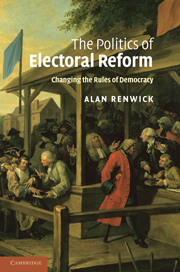Crossref Citations
This Book has been
cited by the following publications. This list is generated based on data provided by Crossref.
Renwick, Alan
Hanretty, Chris
and
Hine, David
2009.
Partisan self-interest and electoral reform: The new Italian electoral law of 2005.
Electoral Studies,
Vol. 28,
Issue. 3,
p.
437.
Celis, Karen
Krook, Mona Lena
and
Meier, Petra
2011.
The Rise of Gender Quota Laws: Expanding the Spectrum of Determinants for Electoral Reform.
West European Politics,
Vol. 34,
Issue. 3,
p.
514.
Johnston, Ron
2011.
BOOK REVIEW.
Representation,
Vol. 47,
Issue. 3,
p.
357.
Renwick, Alan
2011.
Electoral Reform in Europe since 1945.
West European Politics,
Vol. 34,
Issue. 3,
p.
456.
Renwick, Alan
2011.
The Role of Dissident Values in Institutional Choice.
East European Politics and Societies: and Cultures,
Vol. 25,
Issue. 2,
p.
296.
Rahat, Gideon
2011.
The Politics of Electoral Reform: The State of Research.
Journal of Elections, Public Opinion & Parties,
Vol. 21,
Issue. 4,
p.
523.
James, Toby S.
2011.
Only in America? Executive partisan interest and the politics of election administration in Ireland, the UK and the USA.
Contemporary Politics,
Vol. 17,
Issue. 3,
p.
219.
Leyenaar, Monique
and
Hazan, Reuven Y.
2011.
Reconceptualising Electoral Reform.
West European Politics,
Vol. 34,
Issue. 3,
p.
437.
Pilet, Jean-Benoit
and
Bol, Damien
2011.
Party Preferences and Electoral Reform: How Time in Government Affects the Likelihood of Supporting Electoral Change.
West European Politics,
Vol. 34,
Issue. 3,
p.
568.
Hooghe, Marc
and
Deschouwer, Kris
2011.
Veto Players and Electoral Reform in Belgium.
West European Politics,
Vol. 34,
Issue. 3,
p.
626.
Jacobs, Kristof
and
Leyenaar, Monique
2011.
A Conceptual Framework for Major, Minor, and Technical Electoral Reform.
West European Politics,
Vol. 34,
Issue. 3,
p.
495.
Baldini, Gianfranco
2011.
The Different Trajectories of Italian Electoral Reforms.
West European Politics,
Vol. 34,
Issue. 3,
p.
644.
Rahat, Gideon
and
Hazan, Reuven Y.
2011.
The Barriers to Electoral System Reform: A Synthesis of Alternative Approaches.
West European Politics,
Vol. 34,
Issue. 3,
p.
478.
Johnston, Ron
and
Pattie, Charles
2012.
From the Organic to the Arithmetic: New Redistricting/Redistribution Rules for the United Kingdom.
Election Law Journal: Rules, Politics, and Policy,
Vol. 11,
Issue. 1,
p.
70.
Stefan, Laurentiu
Gherghina, Sergiu
and
Chiru, Mihail
2012.
We all agree that we disagree too much: attitudes of Romanian MPs towards party discipline.
East European Politics,
Vol. 28,
Issue. 2,
p.
180.
Wilson, Alex Benjamin
Mair, Peter
and
Bedock, Camille
2012.
Institutional Change in Advanced European Democracies: An Exploratory Assessment.
SSRN Electronic Journal,
Johnston, Ron
Pattie, Charles
and
Rossiter, David
2012.
The principles and processes of redistribution: issues raised by recent UK legislation.
Commonwealth & Comparative Politics,
Vol. 50,
Issue. 1,
p.
3.
Buller, Jim
and
James, Toby S.
2012.
Structure, Agency and the Assessment of Political Leaders: The Case of Gordon Brown's Statecraft.
SSRN Electronic Journal,
Renwick, Alan
2012.
Reforming the House of Lords: Difficult but not Impossible.
Political Insight,
Vol. 3,
Issue. 3,
p.
12.
Cuono, Massimo
2012.
ITALIANS DO IT BETTER? HOW GOVERNABILITY CHALLENGED REPRESENTATION IN ITALY'S ELECTORAL DEBATES (1946–2012).
Representation,
Vol. 48,
Issue. 2,
p.
151.





